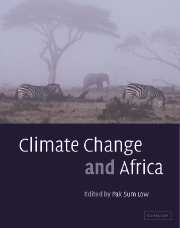Book contents
- Frontmatter
- Contents
- Notes on contributors
- Peer reviewers
- Editor's note
- Foreword
- Foreword
- Foreword
- Foreword
- Preface
- Preface
- Preface
- Preface
- List of abbreviations
- List of SI prefixes
- List of unit abbreviations
- List of chemical formulae
- Part I Science
- Part II Sustainable energy development, mitigation and policy
- Part III Vulnerability and adaptation
- Part IV Capacity-building
- 26 Climate change mitigation analysis in southern African countries: capacity enhancement in Botswana, Tanzania and Zambia
- 27 Capacity-building initiatives to implement the climate change convention in Africa
- 28 Education and public awareness: foundations of energy efficiency
- Part V Lessons from the Montreal Protocol
- Index
26 - Climate change mitigation analysis in southern African countries: capacity enhancement in Botswana, Tanzania and Zambia
Published online by Cambridge University Press: 10 December 2009
- Frontmatter
- Contents
- Notes on contributors
- Peer reviewers
- Editor's note
- Foreword
- Foreword
- Foreword
- Foreword
- Preface
- Preface
- Preface
- Preface
- List of abbreviations
- List of SI prefixes
- List of unit abbreviations
- List of chemical formulae
- Part I Science
- Part II Sustainable energy development, mitigation and policy
- Part III Vulnerability and adaptation
- Part IV Capacity-building
- 26 Climate change mitigation analysis in southern African countries: capacity enhancement in Botswana, Tanzania and Zambia
- 27 Capacity-building initiatives to implement the climate change convention in Africa
- 28 Education and public awareness: foundations of energy efficiency
- Part V Lessons from the Montreal Protocol
- Index
Summary
Keywords
Climate change mitigation; greenhouse gas abatement; energy; forestry; capacity-building; institutional arrangements; Botswana; Tanzania; Zambia
Abstarct
The climate change mitigation studies in Botswana, Tanzania and Zambia shared an institutional set-up in which a non-governmental centre, with close ties to the responsible government ministry, carried out the analytical work. The studies were carried out within the broader context of a methodological development project with a parallel worldwide country-study programme. Each study thus had a threefold purpose: to produce a country report; to establish or enhance national capacity for climate change mitigation analysis; and to contribute to the methodological development process.
This chapter summarizes and reviews the three country studies, discussing the institutional arrangements, the analytical methods used and the specific results obtained. The Botswana study concentrated on energy sector options and introduced a simple method to rank options on the basis of national development priorities. The Tanzania study widened the scope of that country's mitigation analysis to include forestry and land-use options. In Zambia, the analysis team focused on household energy and found a large potential for negative-cost mitigation options.
While the institutional set-up may not be immediately relevant for all country settings, the arrangement presents a number of advantages in terms of effectiveness, motivation and flexibility, which may be applicable elsewhere in Africa and indeed in other developing regions.
- Type
- Chapter
- Information
- Climate Change and Africa , pp. 287 - 296Publisher: Cambridge University PressPrint publication year: 2005



